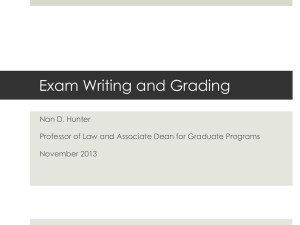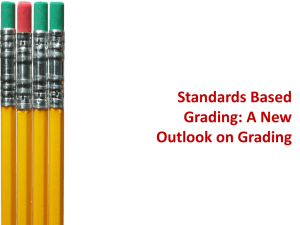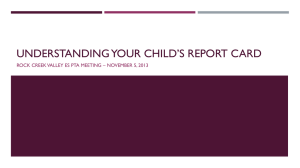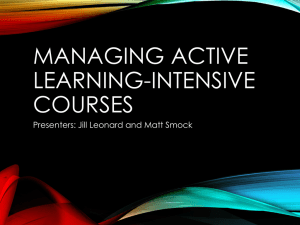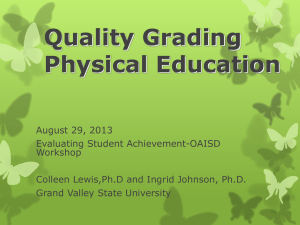What does a grade mean in your classroom? Presented by Amy
advertisement
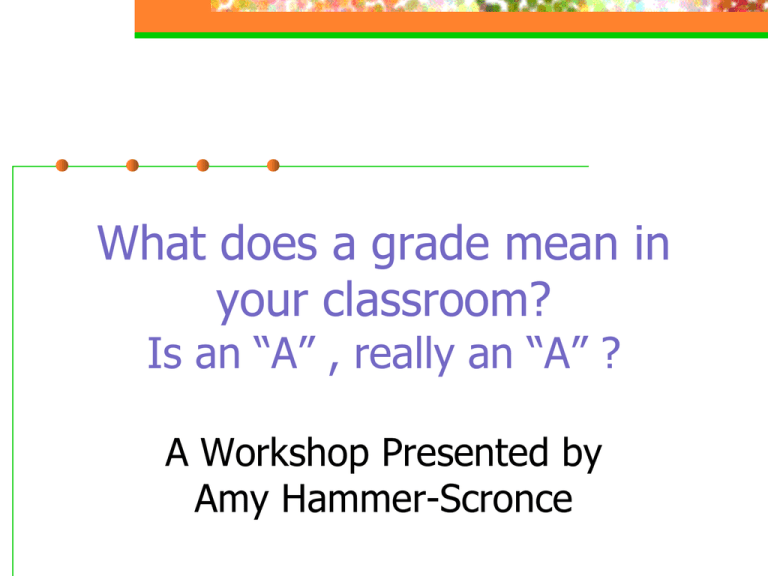
What does a grade mean in your classroom? Is an “A” , really an “A” ? A Workshop Presented by Amy Hammer-Scronce A little history on grading…. Prior to the 1700’s, qualitative feedback was used as a grading method Around 1780, Yale introduced first formalized point grading system In the early 1800’s, Harvard developed a numerical system that closely resembles our own (Marzano, 2000) Three “eras” of education Mid 1800’s to early 1900’s- Focused on the three “R”s, and were taught in a structured, religion based environment. 1910-1975- Focused on intelligence and aptitude The 1970’s- “Decade of state assessment” ( Robinson, 1986 & Stiggins, 2004) Some things to think about.. How many of you feel your grades in school were a true reflection of your knowledge learned? How many of you feel that your grades awarded to your current students actually reflect their learned knowledge? How do you feel about grading students based on ability, behavior, or motivation? Objectives of this workshop To help educators take a closer look at their own grading practices To help determine what should be graded To remind educators of the impacts grades have on our students’ lives To compare current grading practices with recommended research What makes up a student’s grade in your classroom? Homework? Quizzes/tests? Projects? Effort? Attendance? Behavior? Journals? Philosophy… “Grading should be closely correlated with class goals based upon a philosophy of learning and teaching and should reflect what a teacher believes about learning.” (Tomlinson, 2000) So what does that mean? Philosophy should be clearly communicated to all students, preferably in writing. (Friedman & Troug, 1999). Educators should grade solely on achievement, to provide a clear accurate account of a student's growth. Educators need to design an approach to grading that supports rather than discourages student learning. (Friedman, 1995). What do grades mean to our students? How he compares to his/her peers? How much a student has learned/mastered? Will he get into the college of his/her choice? Will he get the scholarship of his/her dreams? The most common, current flaws in educators’ grading policies today…and what research has to say about it… Grading students based on characteristics, such as behavior, effort, or attitude Research says…It clouds the accuracy of the grade, allowing a teacher’s judgment to intercede… (Stiggins, Frisbie, & Griswold, 1989) Continued… Misuse of assessments such as pop quizzes…. Research says… “No teaching and learning takes place when pop quizzes are given, nor can they be justified as motivational” Studies reveal that the threat of low grades only motivates high achieving students. (Canady & Hotchkiss, 1989). Continued… The assignment of zeros… Research says… A zero for work not turned in penalizes a student 10xs more severe than work assessed. Cures for the Common ailments… Student Characteristics??? Assess them and use it as an additional grade, reflected by itself on the report card. Pop quizzes??? Use them as feedback only or simply announce the test. Zeros??? Require students to do the work, assign an IC until the work has been finished. What should we be assessing? Learned Content Knowledge Big Ideas worth understanding Important to Know And Be Able to do Nice to know (Center for K-12 Education) Good Teaching Practices to Consider… Test only what has been taught well Never test students on skills which they have not had opportunities to practice Try to never let students practice failures Keep student characteristics separate (Canady) Activity… You are keeping a record of the cost for heating your house this winter. Using the following months, what would your average be? Dec. $168.00 Jan. $142.00 Feb. $218.00 March $179.00 Average $176.75 Now… average those numbers again, because you forgot to record a month….. Dec. $168.00 Jan. $142.00 Feb. $0.00 March $179.00 Average $122.25 This reveals the real damage of a zero Another Activity… McTighe and Ferrara once said…. “We take the position that the primary purpose of classroom assessment is to inform teaching and improve learning, not to sort and select students or to justify a grade.” Do you agree or disagree? Why?….. Tips for making grades reflect learned knowledge…. Give Effective Feedback: Specific Understandable Descriptive Given in a timely manner Cont…. More tips… Test only what has been taught, and taught well. Behavior, participation, attitude etc… should be reported separately. Provide ample practice time and more tips… Help the student to become an active learner. Appropriate difficulty level. Don’t allow students to accept zeros. Require them to do the work or IC will be given. Learn and Use accurate assessment skills One Final Thought… “There is no place for “mystery” in effective classroom assessment. No mystery/no excuses-let kids in on what is expected” (Jay McTighe) References Canady, R. L., & Hotchkiss, P. (1989, September ). It's a good score! Just a bad grade. Phi Delta Kappan, Retrieved Jan 10, 2006. Friedman, S. (n.d.). Grading teacher's grading policies. Retrieved Jan. 10, 2006, from Principal's Guide to Teacher Grading Policies Web site: www.middleweb.com. Friedman, S. J., & Troug, A. L. (1999). Evaluation of high school teachers' written grading policies. ERS Spectrum, 17. Retrieved Jan 11, 2006. Marzano, R.J. (2000). Chapter 2. What are Grades For? Transforming Classroom Grading. Retrieved Jan. 18, 2005 from http://www.ascd.org/portal/site/ascd/template.chapter.shtml. References Robinson, G. E. (1986). Learning expectancy: A force changing education. Concerns in Education. Educational Research Service. Stiggins, R. J. (1999, Nov. 1). Assessment, student confidence, and school success. Phi Delta Kappan, 81. Retrieved Jan 11, 2006. Stiggins, R. J., & Griswold, P. A. (1989). Inside high school grading practices: building a reseach agenda. Educational Measurement: Issues and Practice, Retrieved Jan 14, 2006. Tomlinson, C. A. (2001, March ). Grading for success. Educational Leadership, 58. Retrieved Jan 12, 2006.

